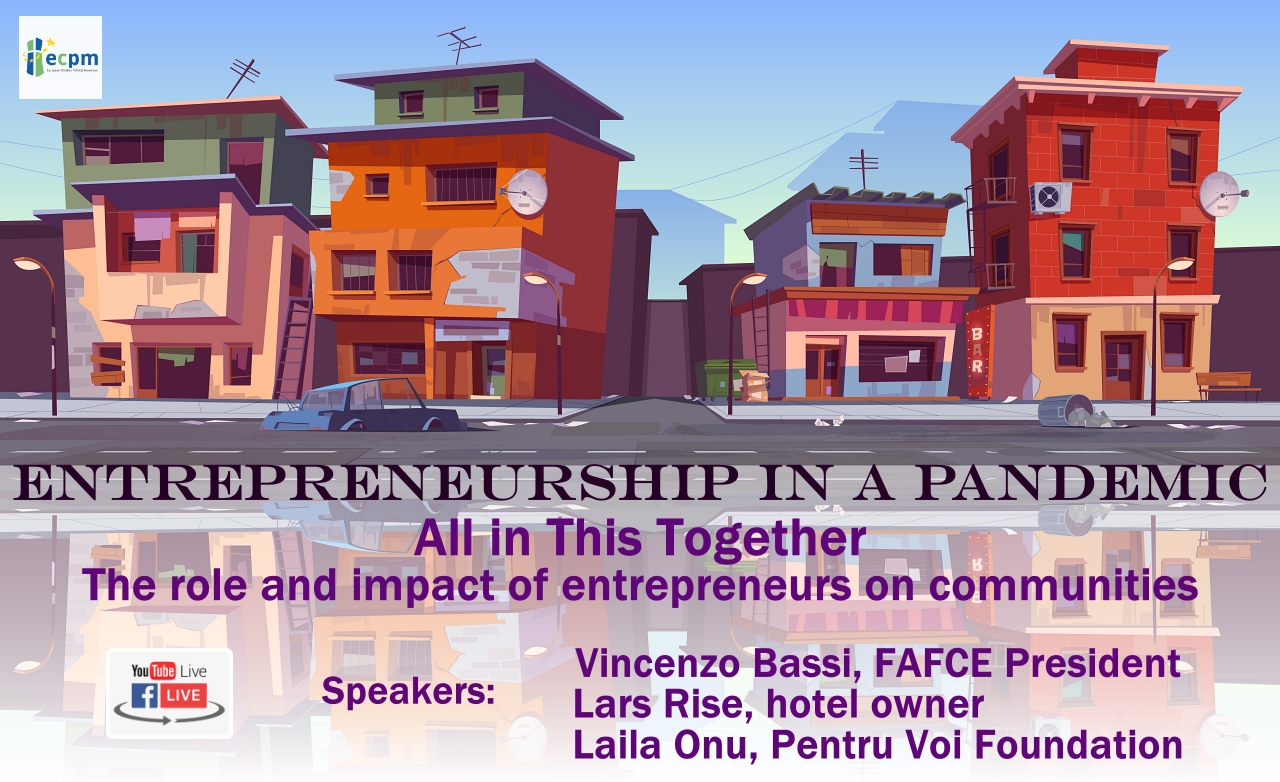
Friday, March 26, 2021 10:30 - Friday, March 26, 2021 11:30
ENTREPRENEURSHIP IN A PANDEMIC. All in This Together. The Role and Impact of Entrepreneurs in Communities
Host: Adriana Rus, ECPM Communications Officer
Speakers: Lars Rise, former Norwegian MP and hotel owner // Vincenzo Bassi, FAFCE President // Laila Onu, President of Pentru Voi Foundation
The third installment of the series focused on the role and impact small and medium sized entrepreneurs can have on their communities; an aspect which might be neglected at the EU level when it comes to disbursing the recovery funds.
In addressing the role of SMEs in their communities, Mr. Bassi focused on the family aspect as the example of proto-enterprise. He spoke of the family unit and how that can be a template for good management, how family-owned businesses are much stronger and more resilient in crisis because of the familial bonds that underpin them and how they can be the glue that holds a community together. He also addressed the issue of mental health and loneliness which the pandemic has exacerbated and advocated for small or micro enterprises where these people can come together and start something beneficial for everyone involved.
Mr. Rise spoke about his family-owned hotel/ resort. It was initially bought and used to gather people together in studying the Bible, to be used as a church building at least partially. Serving people and God continues to be his motivation, even though the building functions now more like a regular hotel. He spoke of the importance of a family managing it as opposed to professional managers doing it; the sense of care and ownership is not the same. He chose to employ people who used to be drug addicts or had a difficult past, based on the idea that employment offers dignity and is the bridge to a better life for people who used to struggle.
The foundation Ms. Onu runs in Romania was started 26 years ago by families who had children or family members suffering from mental challenges or people with special abilities. They serve adults with Down Syndrome and autism, through two main type of services: day care center and residential services (housing). The foundation has also partnered with companies and private entities for which it provides copy and printing services, as a means to maintain financial sustainability.
When addressing the support their business or organization received from the government, Mr. Rise said some of the criteria attached to grants or loans were impossible to meet, a proof that these aid packages were drafted by bureaucrats in the capital who failed to understand how small or family-owned SMEs work. On the other hand, he expressed his gratitude for the understanding of the local and regional governments in delaying or reducing tax payments.
Ms. Onu said that the government helped somewhat but the private fundraising suffered, as people chose to redirect their donations to the healthcare system. In the healthcare system, as well as the Romanian society at large, there is a prejudiced mentality towards people with intellectual disabilities and they are often left behind or de-prioritized. She described the difficulties some of the people she serves had to go through, for instance when hospitalized: because of the restrictions, they could not be accompanied by staff or family members and they were non-verbal so the whole experience was difficult and traumatic.
Mr. Bassi challenged us all to not regard the recovery funds as merely an expense, but an investment in the future generation and he encouraged those drafting the national recovery plans to include measures that address the demographic challenges Europe is facing at the moment.